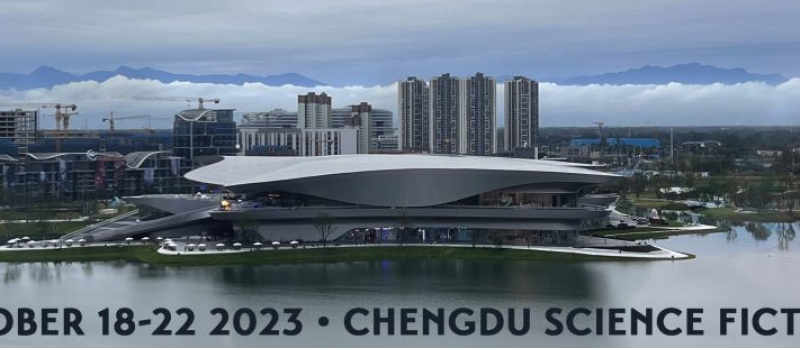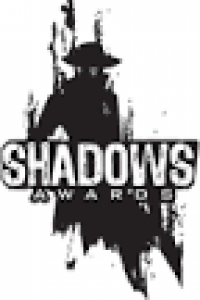Chengdu Worldcon Report
Chengdu Worldcon, the 81st World Science Fiction Convention, took place October 18-22, 2023 at the Chengdu Science Fiction Museum in the Pidu district of Chengdu, Sichuan, China. Guests of honor were Liu Cixin, Sergey Lukianenko (absent), and Robert J. Sawyer, with “promotion ambassadors” Roc Chen, Yang Lei, Gong Linna, and Zhu Tiexiong. One of the joys of having an international convention is seeing the ways different countries embrace and interpret the traditions while incorporating their own. This was, no surprise, a very different kind of Worldcon. While some traditions were notably absent, like the Masquerade, in other ways the canon of what a Worldcon can be was expanded on lavishly. The engagement in the city was impressive, with streets lined with Worldcon banners and signs from central Chengdu and out to Pidu. School children and youth were bussed in and celebrated in performances and with awards. Free drone shows took place in the evenings over the museum before the con opened, drawing crowds to Jingrong Lake to watch.
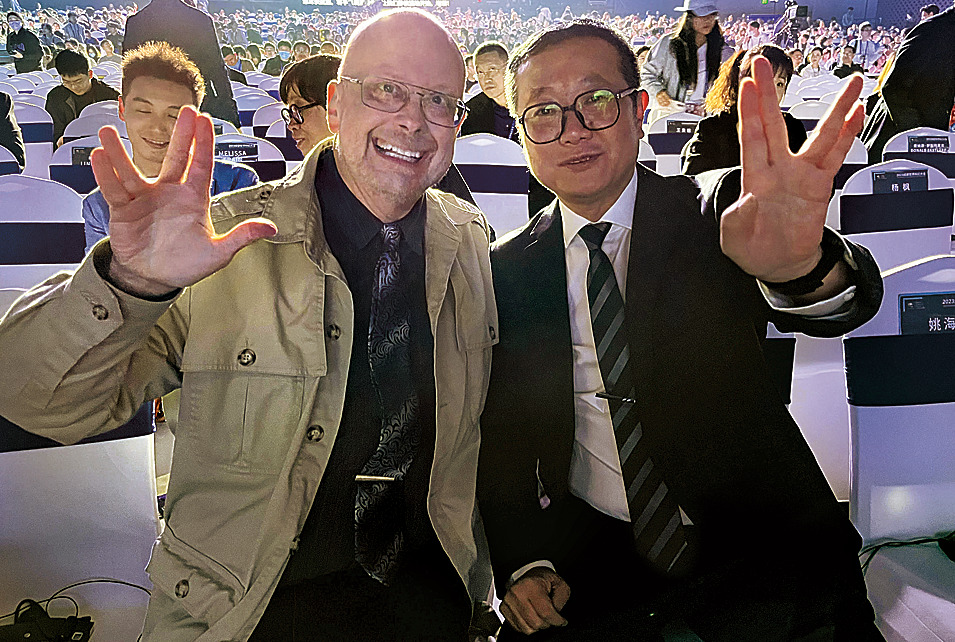
Chengdu Worldcon’s slogan was “Meet the Future,” and a portion of programming items and events were devoted to Chinese technological development and developing “sci-fi industry.” A number of new programs and projects were unveiled or cemented at Worldcon, including the Chengdu Worldcon Brand Promotion Center and the Tianwen Program, to support developing science fiction authors, plus an estimated 8 billion yuan in investment deals signed at the event, including projects in film, publishing, games, and even parks. Co-chair Ben Yalow noted that “we also had significant sponsorship in a way that no Worldcon has ever had, which enabled us to present the attendees with things like translation on a scale that no other Worldcon has been able to attempt.” The main sponsors of Chengdu Worldcon were Chengdu Technology Innovation New City Investment and Development Co. LTD and Chengdu Media Group, who sponsored in aspects including venue rental and facilities, media support, guest invitation and accommodations, and publications and IT support.
Assistant Chengdu Worldcon chair and co-division head of programming Joe Yao reported that in-person attendance was a record 18,895, with attending and virtual members representing over 30 countries and regions, and a combined total attendance of over 20,000. Chengdu Worldcon was the third hybrid Worldcon – following DisCon III in 2021 and Chicon 8 in 2022 – with components for both in-person and virtual attendees. In conjunction with the SF magazine Science Fiction World, a large number of international guests were flown out to attend, beyond just the guests of honor and special guests.
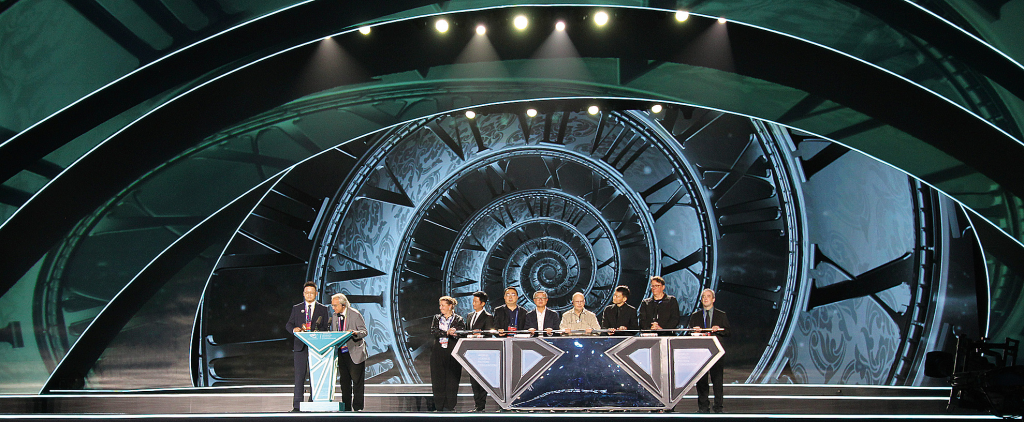
Chicon 8 logged a total of around 6,500 memberships combined, and DisCon III had a total of 9,293. Notably, hundreds, if not thousands of the people watching awards events, wandering the venue and going to panels were Chinese youth, including college students, high-schoolers, and younger. Yalow observed anecdotally it was “one of the youngest Worldcons recently, and that doesn’t even count the large number of school groups who attended the Worldcon.” Special awards were given to Chinese students, and large seating sections were saved at major events.
Located on Jingrong Lake in Chengdu’s Pidu District, the huge nebula-shaped Chengdu Science Fiction Museum is an architectural feat. Commissioned in 2022 from Zaha Hadid Architects for the convention, it was completed with what seems like superhuman speed, and was still being finished up in the days before the con began. The 59,400-square-meter museum featured an enormous skylit atrium containing, among other things, a three-story-high giant statue of BenBen, the robot dog from the Wandering Earth films; the “Time Tunnel,” a walkway lit with an immersive light display; exhibition halls situated around the atrium and on the upper levels; and the 3,500-seat auditorium where the Hugo Awards were held, called Hugo Hall.
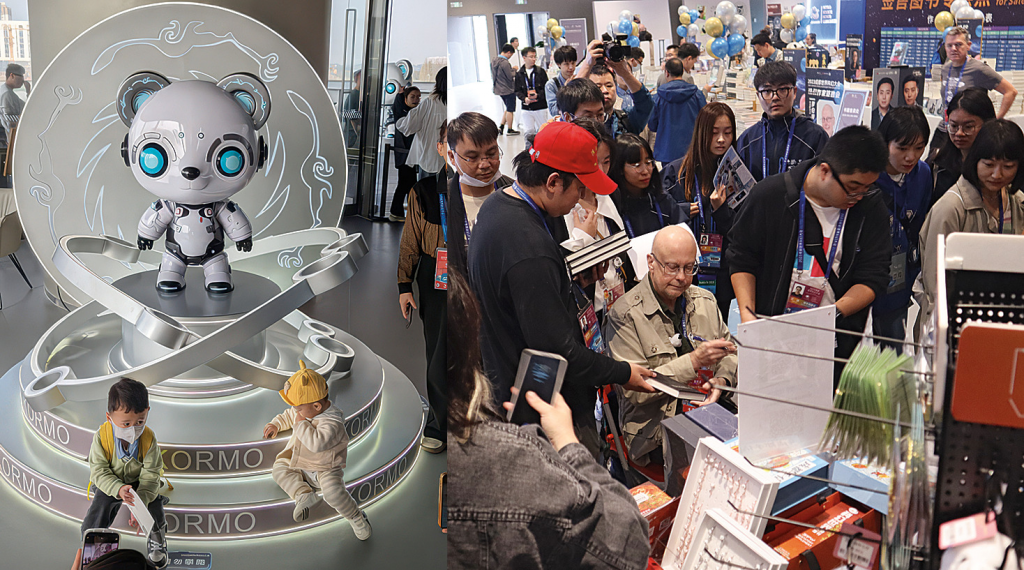
The weather was overcast and warm with occasional bursts of rain. The area offered a variety of dining choices, with more options a short cab ride away, and the Sichuan cuisine was excellent. The con hotels had ample rooms for congoers though they were located far from each other. There were cordons preventing entry to areas around the museum. Heightened security (especially when government officials were on site) meant people couldn’t necessarily enter the main hotel unless they had a badge, which made socializing more challenging. There was no “barcon” as we know it, though much smaller versions of spontaneous hangouts did happen from time to time in spaces such as the hotel lounges.
There was an immense crew of young-adult volunteers who acted asinterpreters and helpers in all facets of the event. Over a thousand Chinese youth competed for the several hundred volunteer spots, considered a prestigious position for the skills required. International guests were each assigned a personal volunteer to help them navigate the weekend. Even as guests were being very well taken care of, including having a fleet of shuttles and private cars to drive them around, communication between the various groups running the convention and the guests was spotty at times and there seemed to be a lot of last-minute preparation for events. That said, despite moments of friction, all in all things came together well. Masking practices varied greatly.
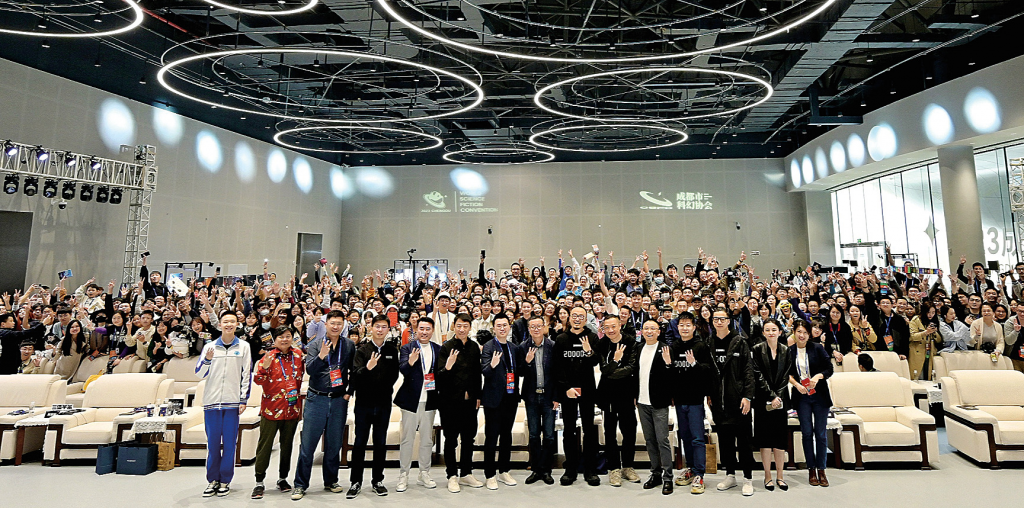
PROGRAMMING
The convention began on Wednesday, with book signings, panels, and the evening Opening Ceremonies, a spectacle unlike any other Worldcon: stage performances, a light show with drones, professional emcees from massive nationally televised events, and more, in front of an audience of thousands. Programming took place at the venue and in the Sheraton function spaces and included 235 in-person film screenings, forums, panels, talks, and workshops, with a reported 1,200 panelists and guests, as well as 23 book signings with a total of around 150 authors and translators. People queued for hours in advance of Liu’s solo book signing, which ran five hours long itself, and Sawyer’s line ran all the way around the top floor of the massive building. RoVirtual programming included event livestreams, a virtual exhibition hall tour, social offerings, and a “metaverse gaming experience.” Most events provided simultaneous translation via earpieces for both audience and panelists.
Panels listed included topics like “Decolonize the Future: Strategies and Solutions to Emerge from the Shadow of AngloSF” with Zhui Ning Chang, Taiyo Fujii, Zeng Ruining, César Arturo Santiváñez Tirado, and Francesco Verso; “Creating a Religion in Science Fiction and Fantasy” with James Bryant, Zoha Kazemi, Jody Lynn Nye, Mark Tompkins, and Yugen Yashima; “Does Anyone Else Care About Cyberpunk?” with James Patrick Kelly, Liu Maijia, and Qi Ran; and “How to Define Science Fiction” with Neil Clarke, Han Song, and Liu Bing.
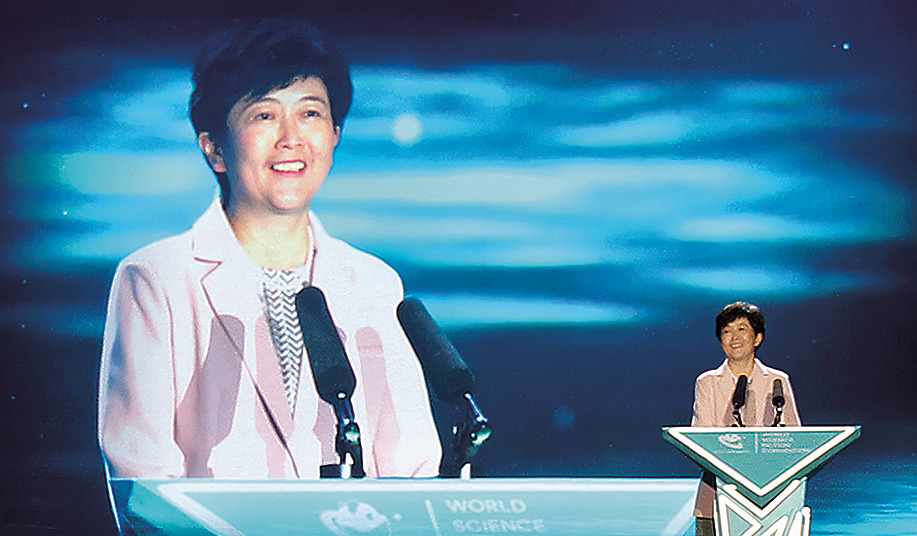
On Thursday, the 6th China International SF Conference had opening ceremonies and the inaugural Tianfu Science Fiction Fantasy Film Festival launched. The 34th China Literature Galaxy Awards were presented that evening to a large crowd at the Sheraton. During the course of the convention several other awards were presented, including the Eighth Sichuan Primary and Secondary School Students’ Composition Contest Award, the 2023 Chengdu Worldcon Composition Competition Award, and the Youth Works Literature and Art categories Gold Awards for the “Fictional Enjoyment of Future” Fine Traditional Chinese Culture Theme Science Fiction Works Competition.
There were generally fewer programming items than the last few in-person Worldcons, but all of them were well attended, if not overflowing, and some in rooms that seated hundreds. According to organizers, around 85% of the in-person panels reached full attendance. Comparatively, Chicon 8 featured 700 in-person program items, with 356 panels, 200 table talks, 63 readings, and 39 workshops; plus 136 virtual panels, 75 virtual readings, 10 virtual meetups, and more, with 759 total program participants. DisCon III featured roughly 500 program items, including an African Programme Stream.

EXHIBITS
There wasn’t a traditional Worldcon art show or dealers’ room, though there was plenty of art and also merchandise to buy. Chengdu Worldcon featured two halls, the Theme Exhibition Hall and the Exhibition Hall for Fans. The first was a large area full of extraordinarily built-out booths hosting 40 technology and media companies, with large walk-through areas and some full-immersion video displays – think hi-tech Comic-Con displays. Yao said, “One notable aspect of the programs at Chengdu Worldcon is the inclusion of top enterprises in the science fiction and related fields, such as Weta Digital, Huawei, Tencent, Three Body Universe, and various institutions. These organizations organized key panels and forums covering topics related to the science fiction industry, films, comics, games, art, and literature.”
The second, the Hall for Fans, provided a small table and backdrop space each for 36 groups, including science fiction clubs from several local universities, the Glasgow 2024 and Seattle 2025 Worldcon teams, artists, Locus, the Science Fiction Writers Union of Korea, the Tibetan Science Fiction Association, Terra Ignota Illustration Showcase, and more. Fans thronged the tables, asking questions, taking pictures, and sharing their SFnal experiences.
Between customs, shipping, and communications about Chineseregulations, bringing goods into the country to sell in quantity, especially literature, was prohibitively difficult, so most of the items were from inside China. There were several places to buy Worldcon merch, the main one being a large official store off the central hall, full of mementos, hats, pillows, pens, bags, and more. Chengdu’s adorable mascot robot panda Kormo was on everything. There were long lines to enter, and the shops did booming business for the entire con.
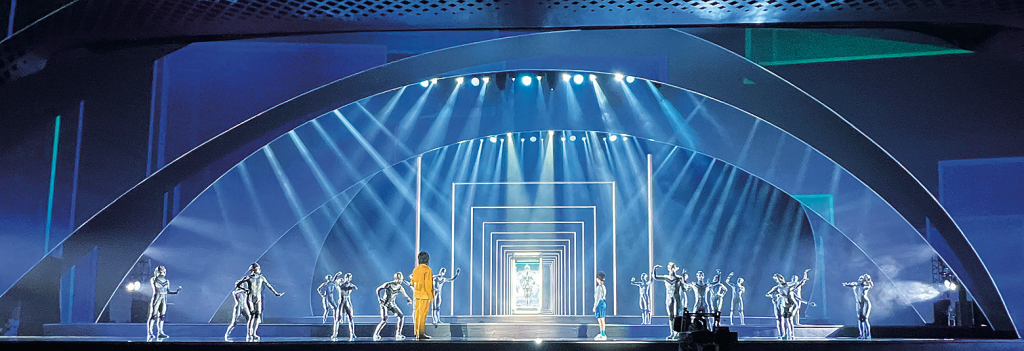
PARTIES
Parties included the Hugo Night Lakeside Party held at the museum after the Hugos, which included a hosted bar, local artists making gifts for the guests, several dance performances, and a band. There were also the SFW costume party and a number of fan parties held at the Sheraton – notably the Doctor Who fan party “Who Is Coming?”, which won the best fan party award presented at Closing Ceremonies.
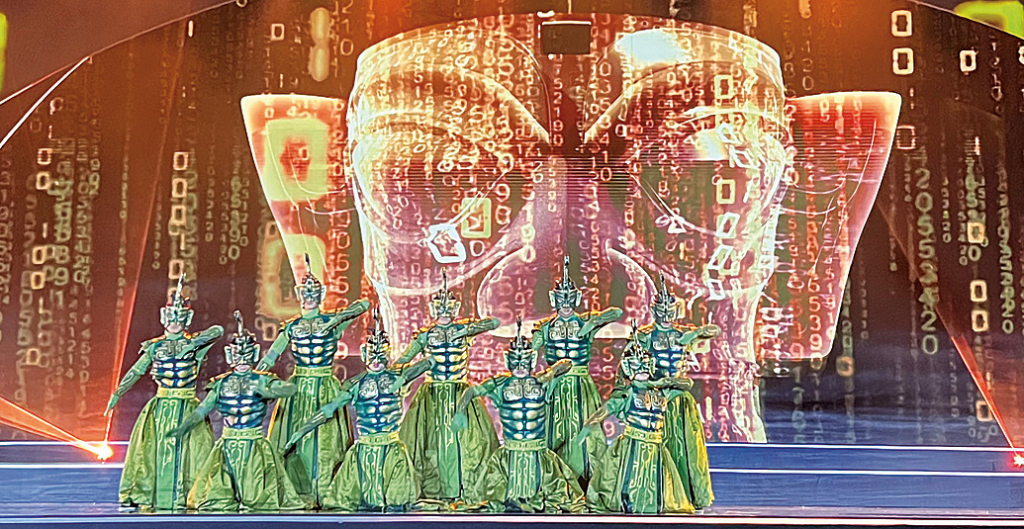
CON PUBLICATIONS
The English and Chinese language member guidebook was 295 pages in full color, trade paperback size with a variation on French flaps, and with the languages back to back. Contents included greetings from the co-chairs, information about the venue, the hotels, and the city of Chengdu, a detailed program schedule, WSFS business meeting materials, and a brief glossary of useful Mandarin words and phrases.
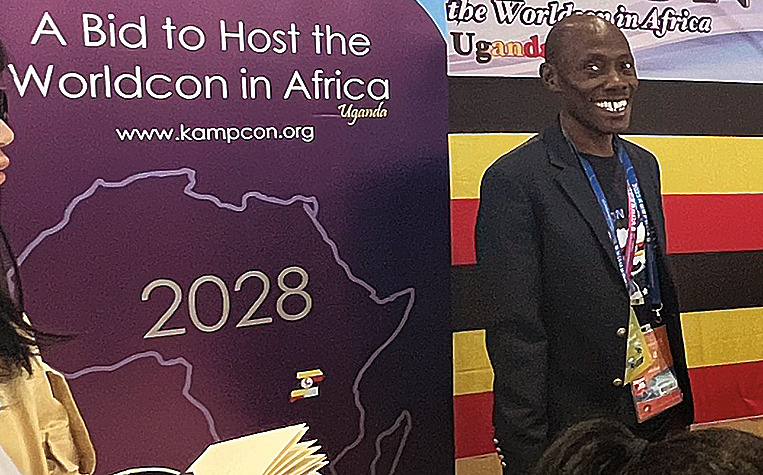
HUGO AWARDS
The 70th Hugo Awards Ceremony took place at 7:00 p.m. on Saturday, October 21 in Hugo Hall. Around 3,000 members and guests attended in person. As with many of the larger presentations, general admission to the Hugo Awards was by lottery with carefully controlled entry (security was serious throughout the con) and left crowds of people envious they could not get in. The event was livestreamed on the convention’s virtual platform, though there were reports that the audience experience varied. “Our biggest failure was in respect to the virtual program for people outside China,” said Yalow. “We have received multiple reports that people had difficulties viewing our online content, although many people were able to see significant parts of the online program, and we are planning on putting the major ceremonies online.”
The ceremony kicked off with a drum performance by lively guest performer Songyen, who asked audience members to participate by drumming or clapping one of two simple rhythms, corresponding to a one or a zero on the back of the seat in front of them. Li Bo, Yuan Li, and Zhou Weiyi, the three emcees, gave opening remarks emphasizing that Chengdu Worldcon was the first to be held in China and only the second held in Asia. A short video followed, featuring clips of fans from around the world describing their love for science fiction and wishes for the future, in line with the “Meet the Future” Worldcon theme. Lastly, a group of children dancers in silver and blue space suit costumes performed. Jumping and cheering, they high-fived the audience members in the front row as they exited to make way for the award presentation.
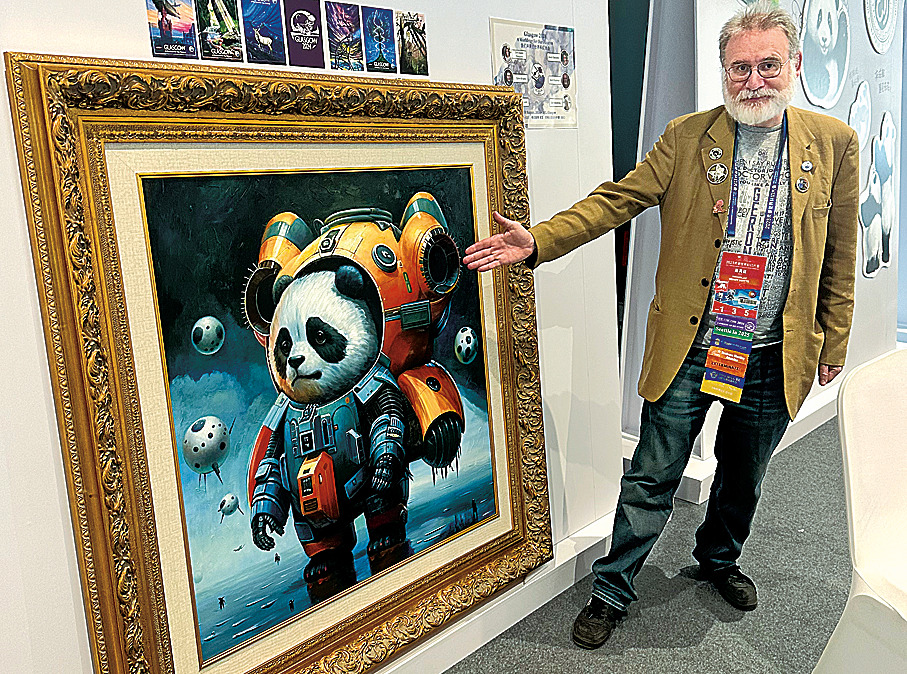
The first award of the evening was the Big Heart Award for Outstanding Contributions. The Star Wars theme played as Yalow presented the award. The winner was Bobbi Armbruster, who was not present to accept.
Program division co-chair Carolina Gómez Lagerlöf presented the Astounding Award for Best New Author to Travis Baldree. Baldree accepted via video, saying, “I am unbelievably grateful to be recording this video. To have been considered at all is a profound honor.”
Lagerlöf also presented the Lodestar Award for Best Young Adult Book, which went to Akata Woman by Nnedi Okorafor. Okorafor accepted in person. Winners who accepted in person were each accompanied onstage by a child in a space suit costume as a representation of the “Meet the Future” theme. Okorafor thanked her editor, Jennifer Bach; her daughter, Anyaugo; and her cats, Periwinkle and Neptune, and briefly discussed the way her experience in COVID lockdown influenced the book’s psychedelic elements.
There followed a performance of music from Journey to the West, played by a nine-part ensemble including electric guitar, violin, dizi, pipa, drums, keyboard, and cello, in costumes that combined traditional Chinese dress with futuristic accessories.

The first Hugo Award presented was for Best Fan Artist. Ann Marie Rudolph presented the award to photographer and artist Richard Man. Man accepted in person, and in his speech discussed the importance of failure and love in the artistic process: “As a creator, we have a drive to make things. We want to bring a vision to life. And to do that we will fail… But what we need to do is pick ourselves up, rest, and try again.”
The award for Best Fan Writer was presented by Hongwei Wang, and won by Chris M. Barkley. Barkley accepted in person, and began his speech by greeting the audience in Mandarin, to exuberant applause. He thanked the voters, noted that he was the first person of color to win the award for BestFan Writer, and stressed the importance of recognizing the contributions of people of color, saying, “The world is vast and wide, and there are many other voices to be heard and honored.” To help others receive recognition, Barkley recused himself from future nominations for the award.
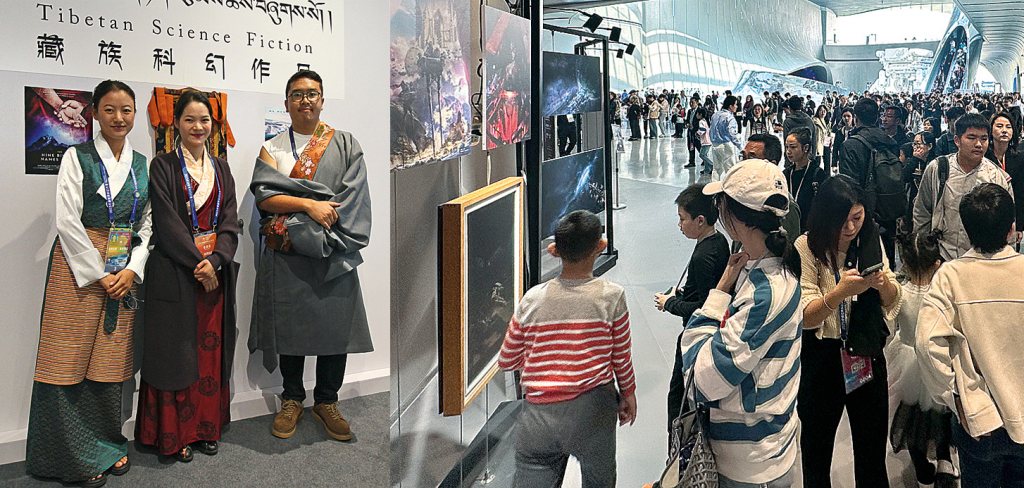
Clarkesworld publisher Neil Clarke presented the award for Best Fancast to Hugo, Girl! Podcast creators Haley, Lori, and Amy thanked Seth Heasley of the podcast Hugos There, as well as a number of other podcast creators, for helping them to expand their audience, and gave podcast editor Kevin a special shoutout.
Locus’s editor in chief Liza Groen Trombi presented the Hugo for Best Fanzine to Zero Gravity Newspaper, published and edited by RiverFlow with several issues guest edited by Ling Shizhen. They enthusiastically accepted in person, and thanked the fans for their support. Riverflow discussed his work writing about the history of Chinese science fiction. Ling Shizhen thanked his family, editor Echo, and RiverFlow.
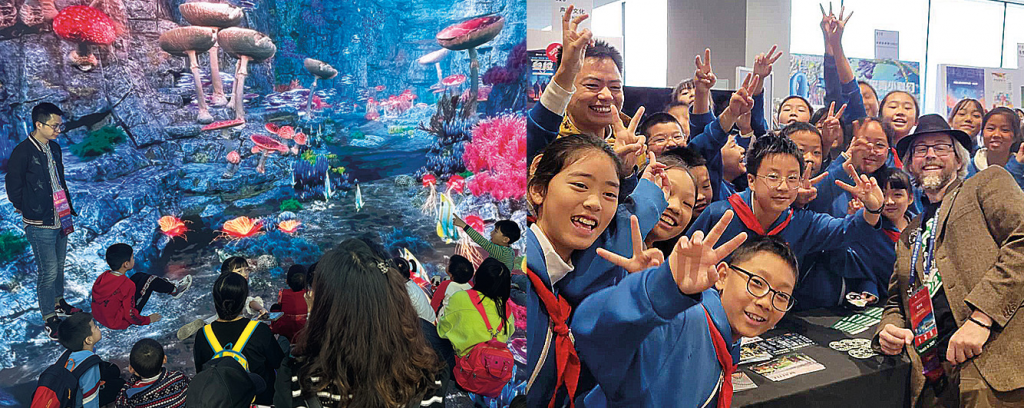
A performance of music from Pirates of the Caribbean followed this set of awards, played by the same ensemble that performed earlier in the ceremony.
The Hugo for Best Semiprozine was presented by Yao to Uncanny, published and edited by Lynne M. Thomas & Michael Damian Thomas, with managing editor Monte Lin, assistant editor Tania Chen, and podcast producers Erika Ensign & Steven Schapansky. The magazine’s editors accepted with a video containing speeches from nonfiction editor Meg Elison, Lin, and the Thomases. Elison said, “It’s an honor to produce this work for the international science fiction community, and it’s an honor to have this work recognized.” Lin expressed his gratitude to each member of the Uncanny editorial team and said, “I especially appreciate our Space Unicorns for reading, supporting, and talking about the stories, essays, and poems in Uncanny…. Please stay magical and stay glittery.” The Thomases thanked the Uncanny editorial team; agent Lisa Rogers; “every single member of the Space Unicorn Ranger Corps;” and their daughter, Caitlin, who also appeared in the video.

Cofounder and CEO of Wētā Workshop Richard Leslie Taylor presented the award for Best Professional Artist to Enzhe Zhao. Zhao briefly described his work promoting SF art in China.
Chengdu Worldcon co-chair Raistlin Chen presented the award for Best Editor, Short Form to Neil Clarke. “You like me and you gave me a panda!” Clarke said, referring to the design of this year’s Hugo trophy. Clarke thanked his family, as well as the Clarkesworld staff and authors, with particularemphasis on “all the wonderful authors we’ve published in translation from China.” He offered encouragement to the children present, saying, “I started reading science fiction at age ten. I never imagined that I would be on this stage. The Hugo was for my heroes… I want to come back here in ten years and see one of you up here.”

Kevin Standlee presented the award for Best Editor, Long Form to Lindsey Hall. Hall said, “As Best Editor, I have to first and foremost thank the brilliant and one-of-a-kind authors that I get to work with. You know, our stories that we tell–that’s our hearts, and that I get to play even a small part in sharing people’s stories with the world–it’s truly a joy.”
The musicians then returned to the stage, this time to perform music from the Wandering Earth franchise. Wandering Earth director Frant Gwo gave a short speech expressing his pride at having the Hugos in China and at hearing the Wandering Earth music performed at the ceremony. Quoting Liu Cixin, he urged everyone to always be curious. Guo’s speech was followed by a video consisting of clips from SF films and shows, as well as quotes from prominent SF figures such as Jules Verne and H.G. Wells.

Guo presented the award for Best Dramatic Presentation, Short Form to The Expanse: “Babylon’s Ashes”, written by Daniel Abraham, Ty Franck & Naren Shankar, directed by Breck Eisner. Abraham accepted by video, and said, “I can’t tell you how much we are honored by your attention and your approval, and how much all that we did on The Expanse was a love letter for science fiction: the science fiction that we love and the community that supports projects like us and projects like Worldcon.”
Lei Yang, director of the Three-Body TV series, presented the award for Best Dramatic Presentation Long Form to Everything Everywhere All at Once, written and directed by Daniel Kwan and Daniel Scheinert and produced by the Russo brothers and Jonathan Wang. Vincent Docherty accepted on behalf of the film’s writers and directors.
Prior convention chair Helen Montgomery presented the award for Best Related Work to Terry Pratchett: A Life With Footnotes by Rob Wilkins. Wilkins accepted by video, and said, “Terry himself never won a Hugo. It was always a great shame to him that he didn’t. So I would just like to offer my humble thanks to you all and make it abundantly clear that this one is absolutely for him.”
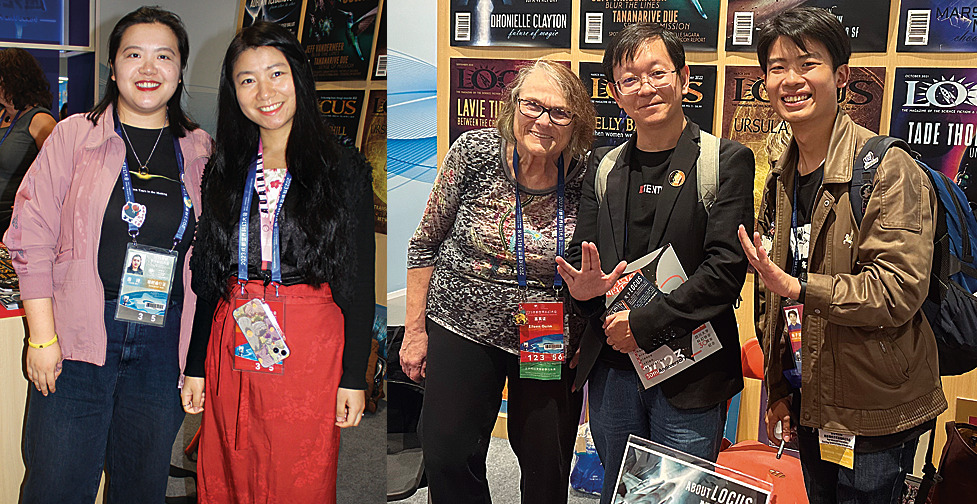
Honorary convention chair Xiaolan Liang presented the Hugo for Best Graphic Story or Comic to Cyberpunk 2077: Big City Dreams by Bartosz Sztybor, art by Filipe Andrade, Alessio Fioriniello, Roman Titov, and Krzysztof Ostrowski. Sztybor accepted, and described his pride at being the first Polish Hugo winner and how the risk of following his dream to write comic books for a living had finally paid off.
The award for Best Series went to Adrian Tchaikovsky for the Children of Time series. Tchaikovsky was not present, but provided an acceptance speech which Jeremy Szal read on his behalf. He thanked editor Philip Hagan, audio narrator Mel Hudson, and agents Simon and Oliver, and cited the research of Dr. Fiona Cross as inspiration for the series.
A group of children sang a memorial song for the In Memoriam, accompanied by a projection of the song’s lyrics and the names of the people to be remembered against a starry background.

Yalow presented the award for Best Short Story to “Rabbit Test” by Samantha Mills. Mills accepted by video, in which she thanked the Thomases and said, “Thank you to everybody who read it, everybody who shared it, thank you to everyone who nominated it, and all of the Hugo voters for taking time to read it.”
Liu Cixin presented the Hugo for Best Novelette to “The Space-TimePainter” by Hai Ya. Ya accepted in person, and talked about his childhood reading science fiction as well as the challenges of being a writer with a day job. He described the experience of being at the con in person as surreal, and thanked his editors and fans as well as the convention organizers.
Dave McCarty presented the Hugo for Best Novella to Where The Drowned Girls Go by Seanan McGuire. Daniel Spector accepted and read a speech on her behalf. “Where the Drowned Girls Go was a very difficult book for me to write for a lot of reasons, including the focus on bullying from authority figures and the way we treat anyone we see as different. This is a hard time to be a weird kid. It’s a hard time to be a weird adult. We need to protect ourselves and each other and our world.” She thanked Spector, agent Diana Fox, and editor Lee Harris.

Guest of honor Robert J. Sawyer presented the award for Best Novel to Nettle and Bone by T. Kingfisher. Arley Sorg accepted on Ursula Vernon’s behalf. Her characteristically unique acceptance speech described a species of beetle that can survive being swallowed by a frog, and concluded, “The moral of this story, if there is one, is that no matter how dark the situation, there is always a way through. And there’s always a light at the end of the frog.”
Yao called the 2023 Hugos “undoubtedly a milestone,” noting that “Twenty-two Chinese works, authors, and artists made it onto the ballot, marking the first time non-English works have been nominated for the Hugo Awards.” He added that “in addition to the awards, this year’s ballot facilitated comprehensive exchange and communication between Chinese and international science fiction publishers.”
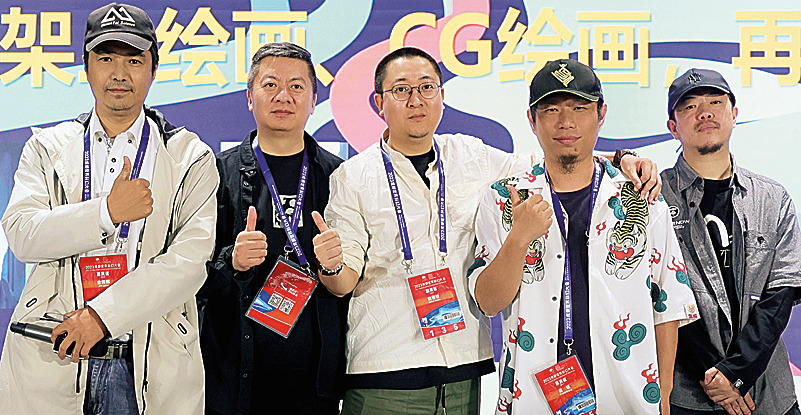
WORLDCON 2024 AND BEYOND
The gavel was successfully handed off to Glasgow during closing ceremonies. The 82nd World SF Convention, Glasgow 2024, is scheduled for August 8-12, 2024, at the Scottish Events Campus in Glasgow, Scotland, and will feature guests of honor Chris Baker, Claire Brialey, Ken MacLeod, Nnedi Okorafor, Mark Plummer, and Terri Windling.
The 83rd World SF Convention, Seattle Worldcon 2025, is planned for August 13-17, 2025 at the Seattle Convention Center, Summit, and will feature guests of honor Alexander James Adams, Donato Giancola, Bridget Landry, and Martha Wells, with hosts K. Tempest Bradford and Nisi Shawl.
-Simon Herz with input from Locus staff
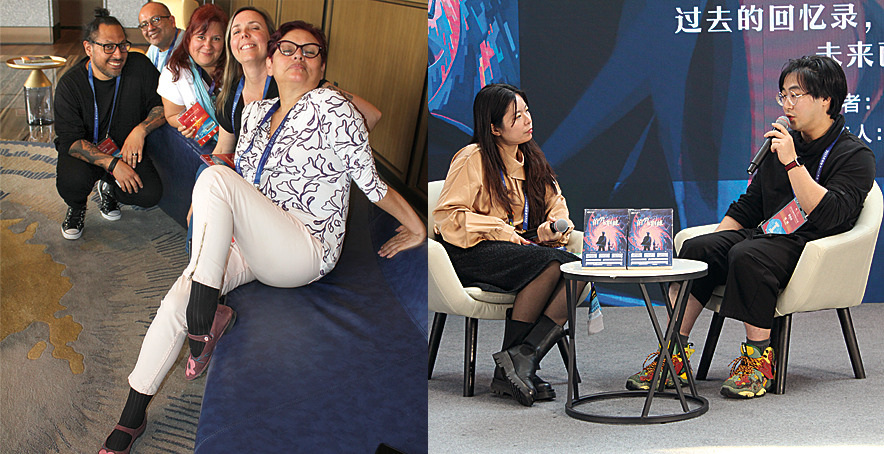

Yasuhiro Takeda
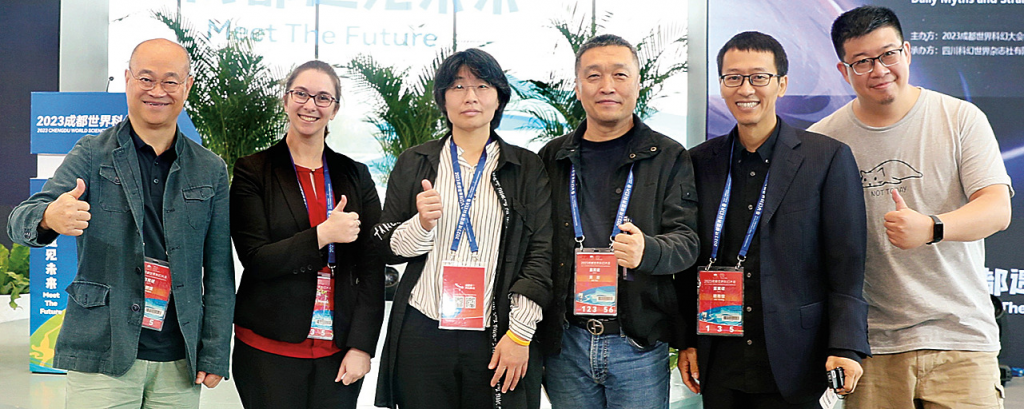






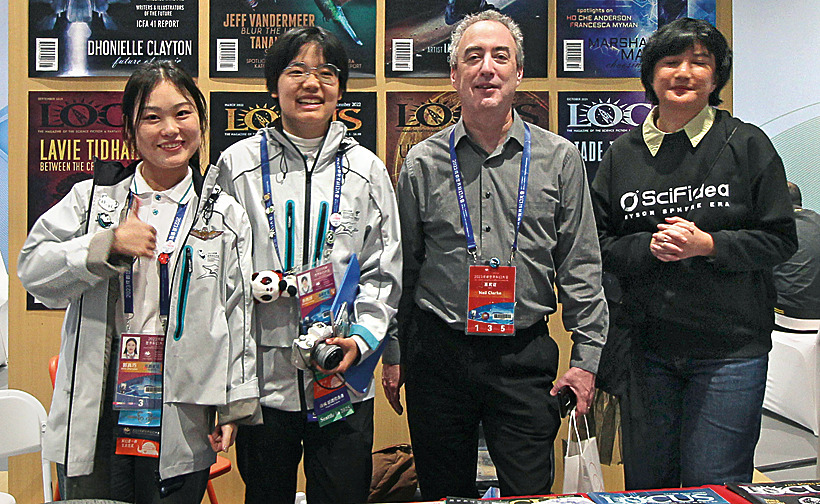

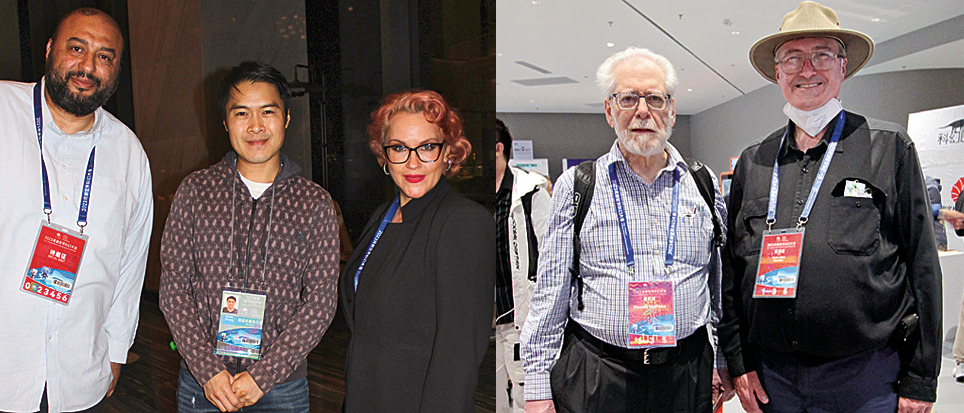

Wang You, Aorilige, and others

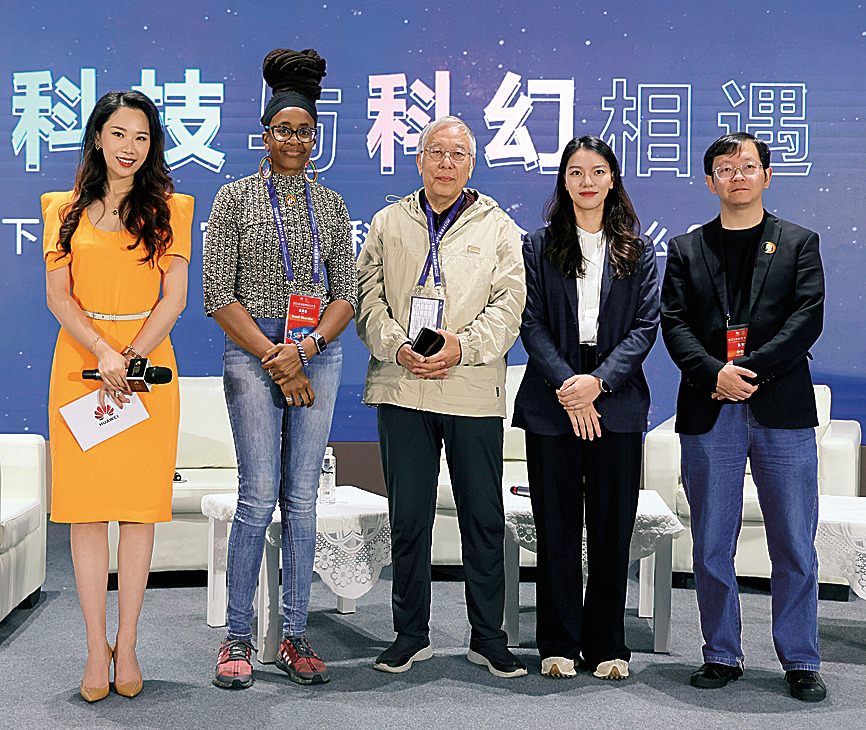


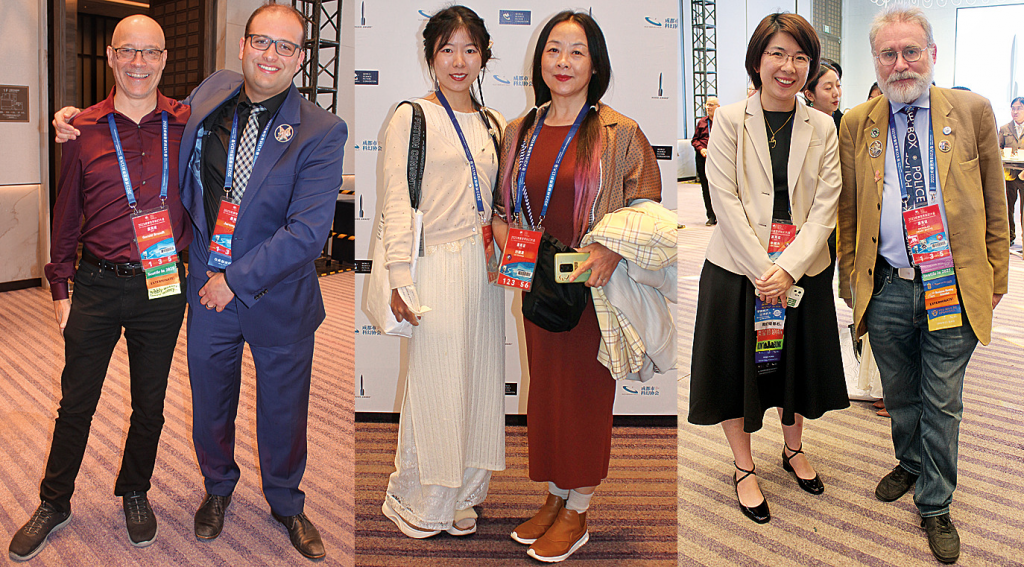
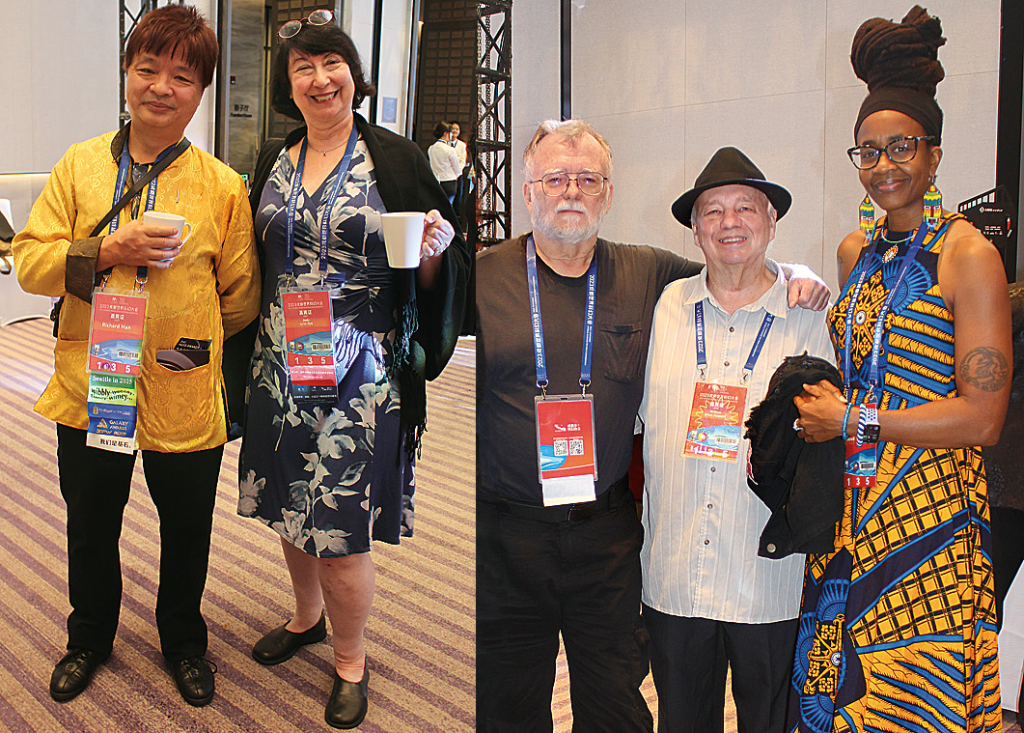
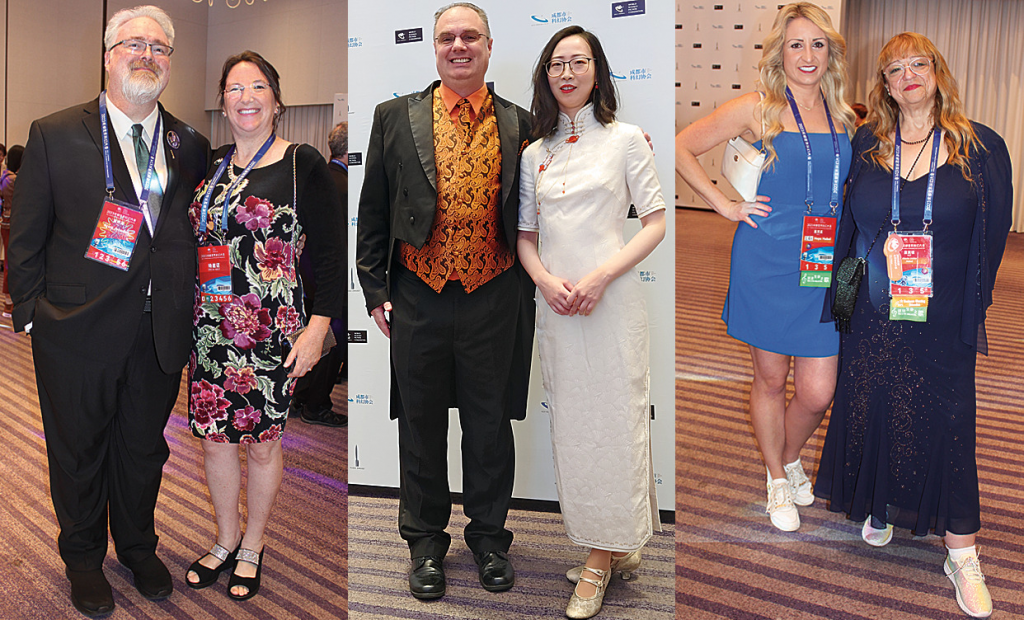
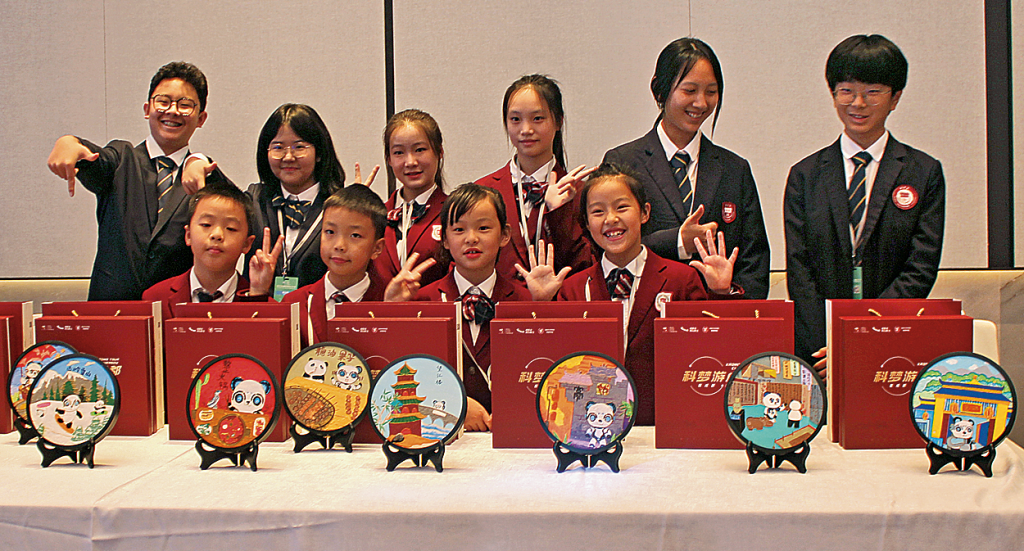

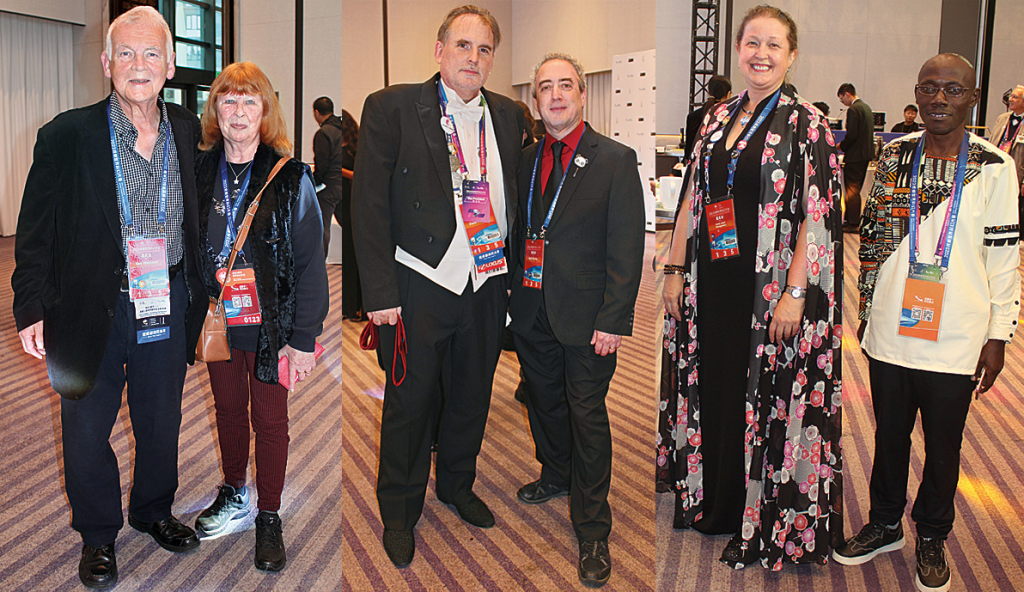
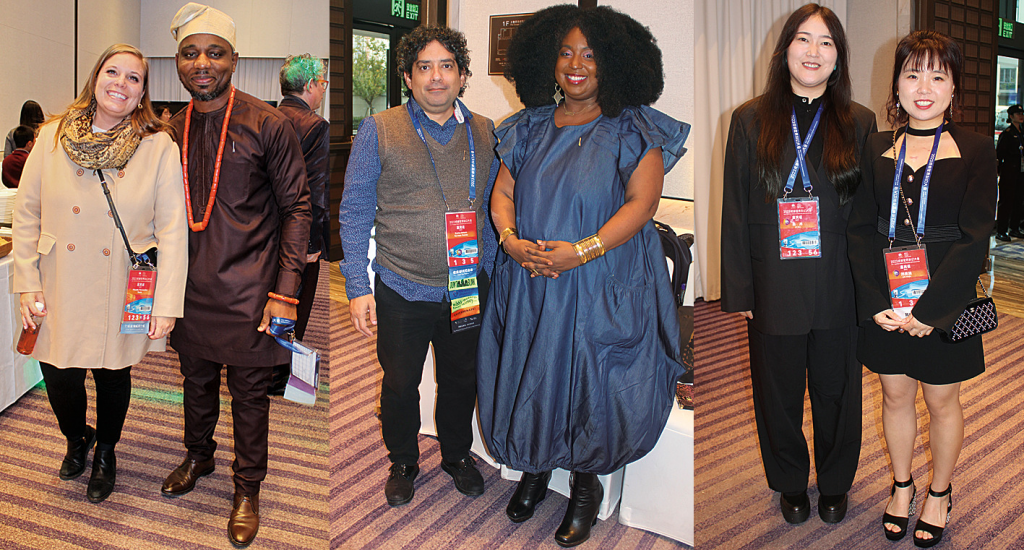
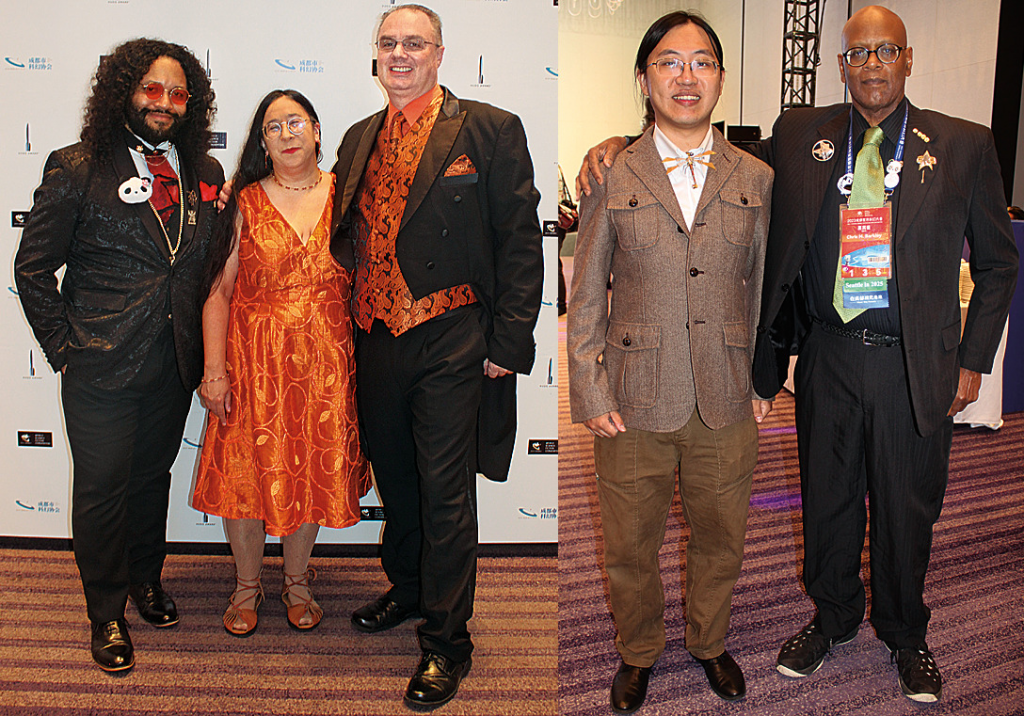


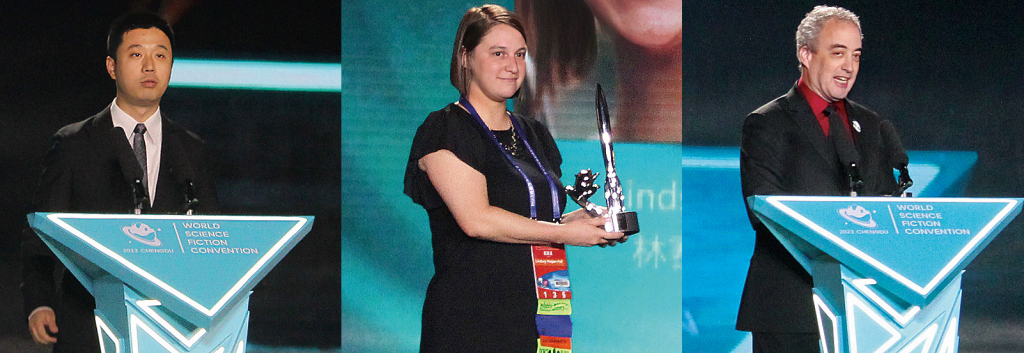

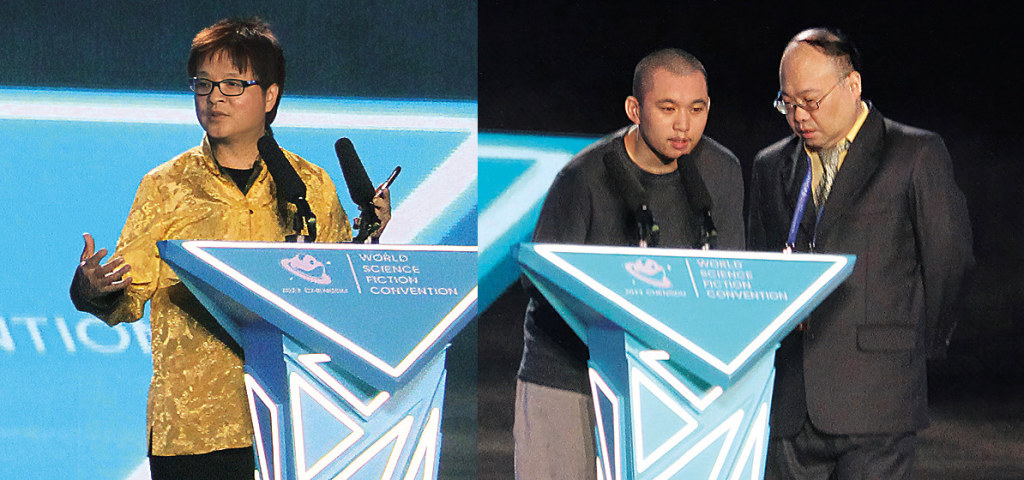
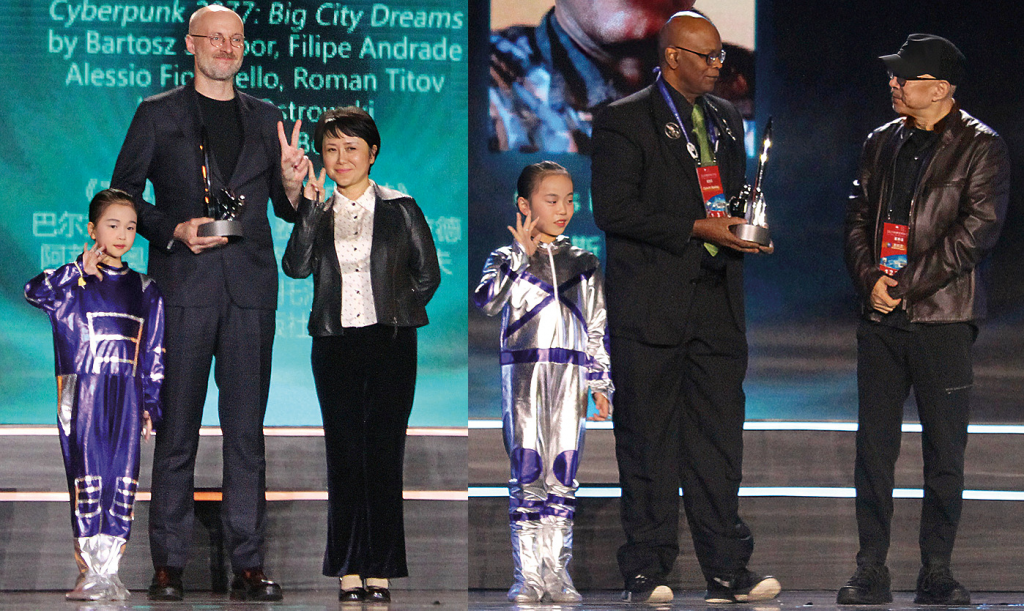
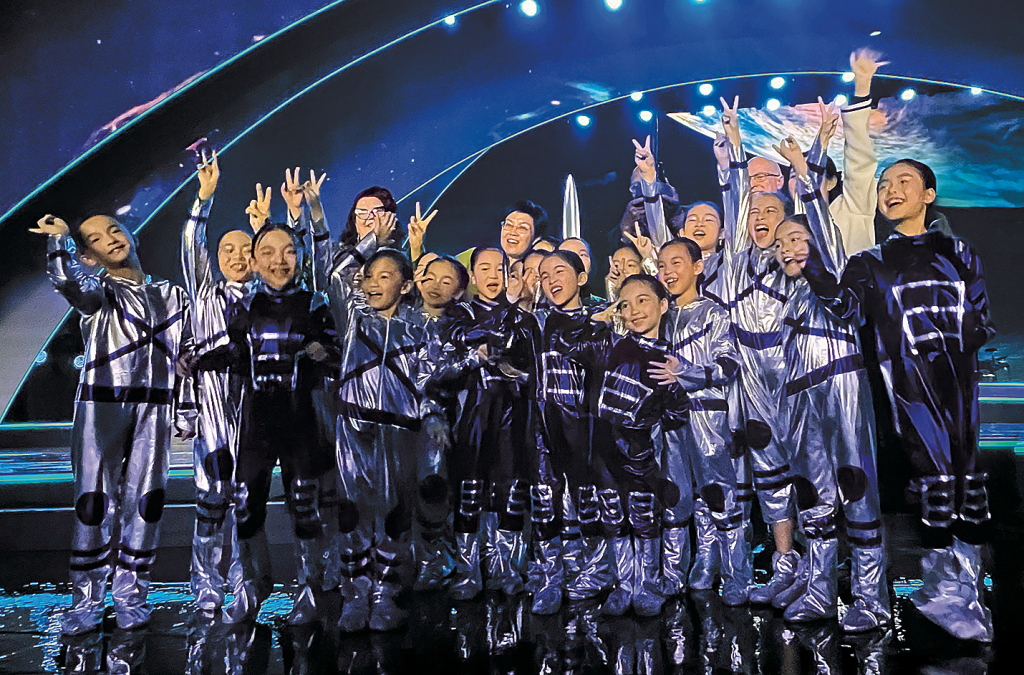

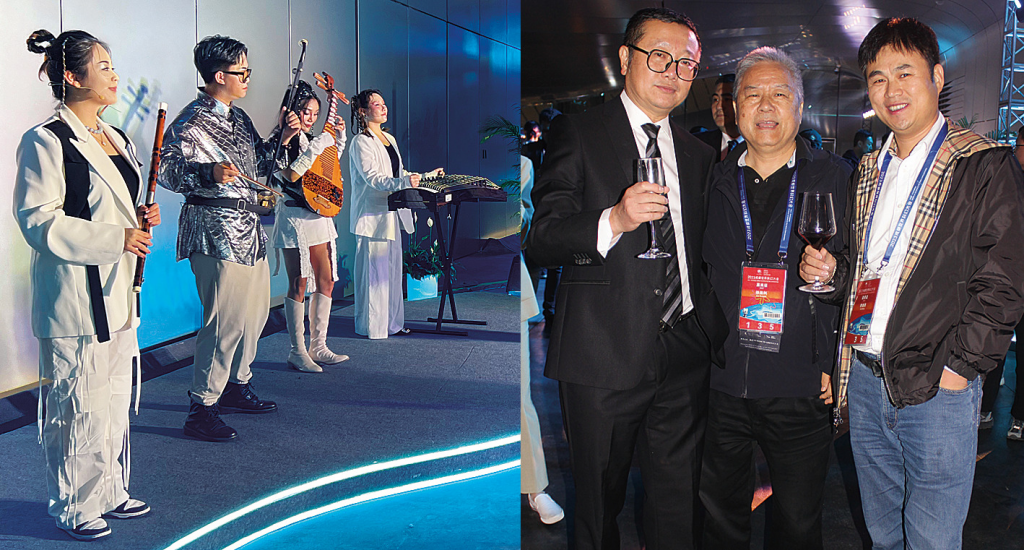
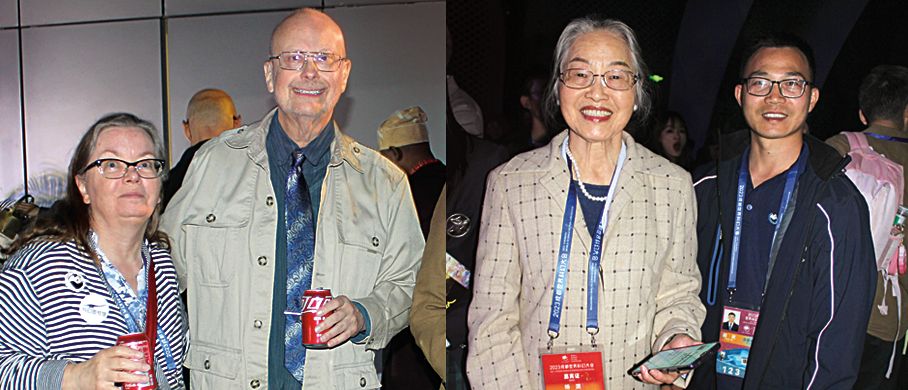
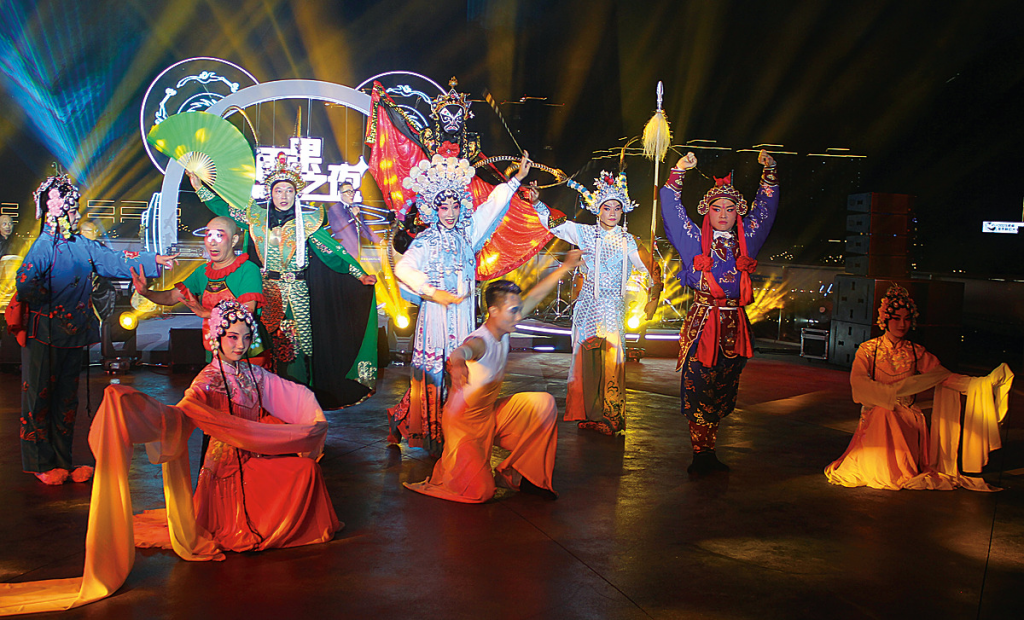

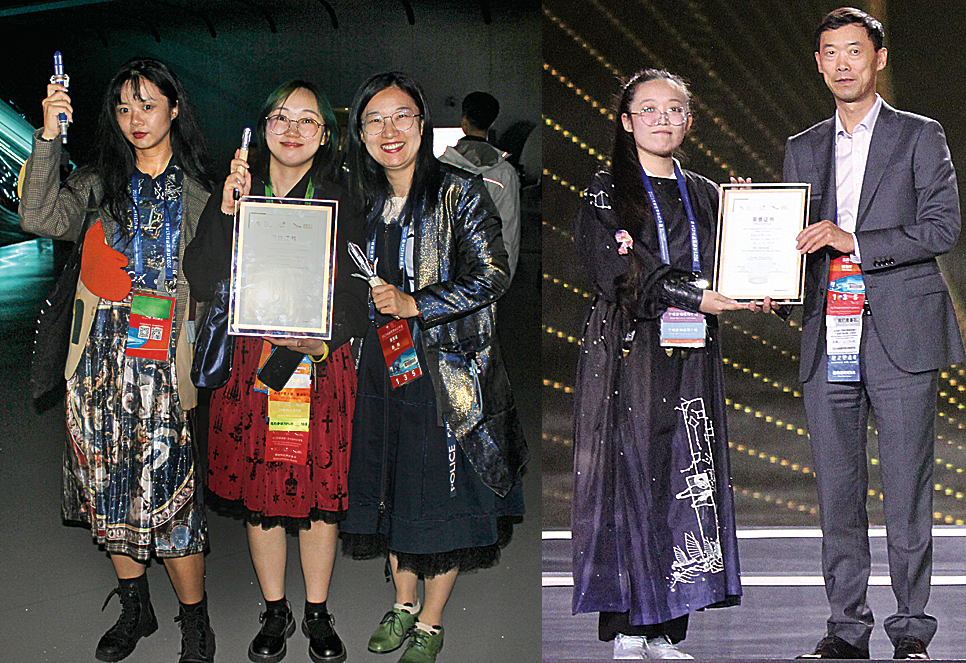
Yao Haijun
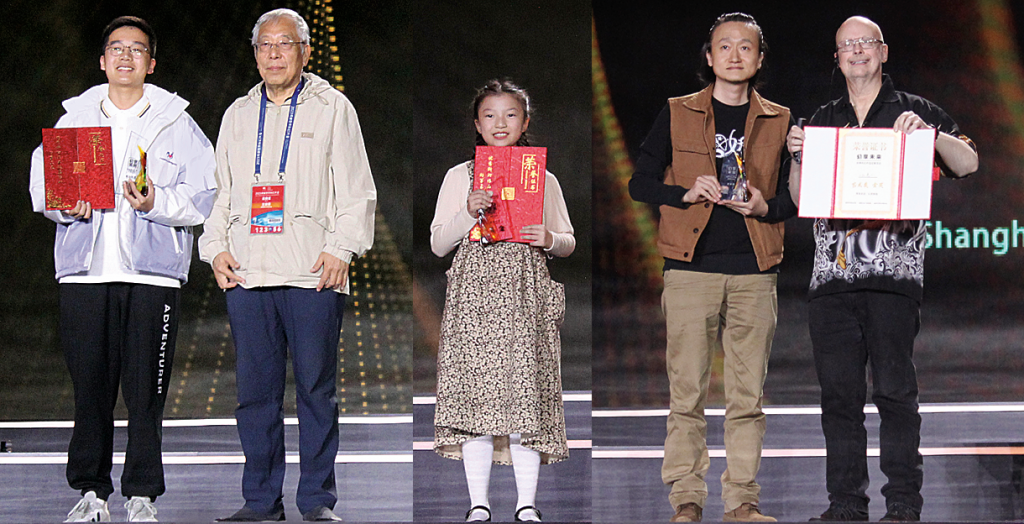
(presenter), Zhu Yining (Art); Xu Ning (Science Fiction Art Gold Award winner), GoH Robert J. Sawyer
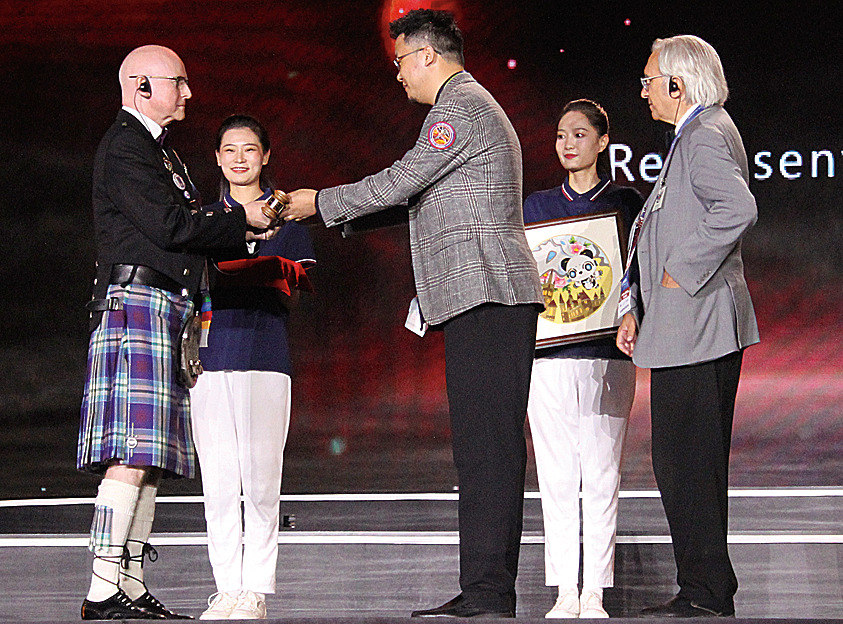
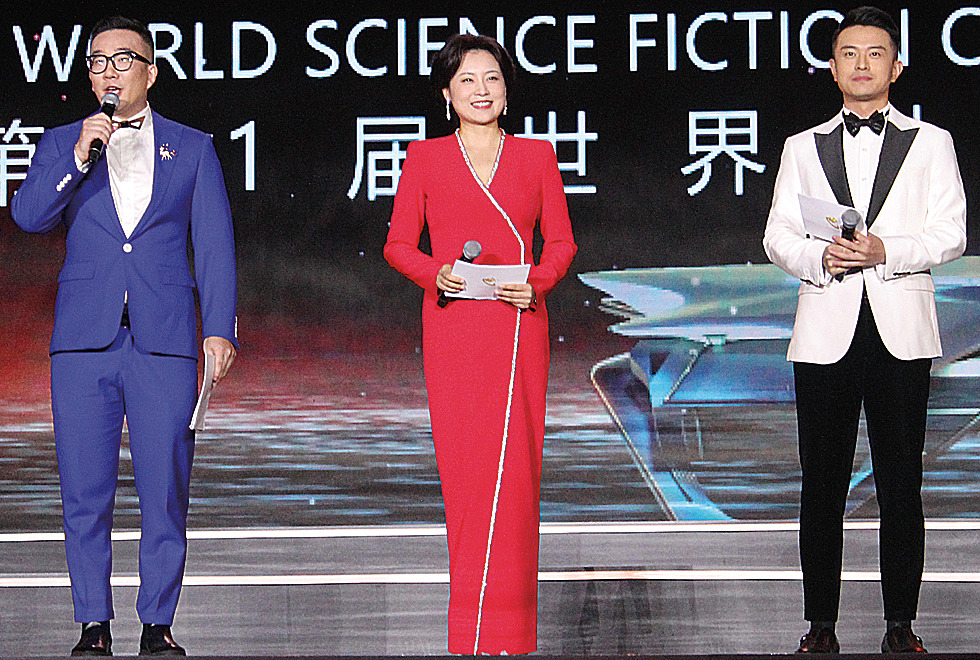


Photographers: Francesca Myman, Liza Groen Trombi, Arley Sorg, Carolyn Clink, Dave McCarty, Alan Bond, Zhang Bei, and Chengdu Worldcon 2023 staff.
While you are here, please take a moment to support Locus with a one-time or recurring donation. We rely on reader donations to keep the magazine and site going, and would like to keep the site paywall free, but WE NEED YOUR FINANCIAL SUPPORT to continue quality coverage of the science fiction and fantasy field.
©Locus Magazine. Copyrighted material may not be republished without permission of LSFF.


